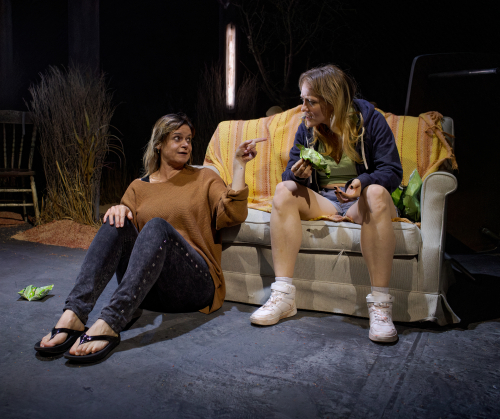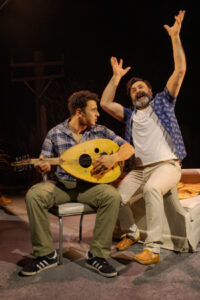Lennox Theatre, July 27
4/10

Ostensibly it’s Tahmoor – one of many close-to-Sydney towns through which the Hume Highway once crawled, before the expressway scorched across the landscape – that’s the prison for Karim and Beth. But really it’s family. Some iron combination of guilt, love and habit have been forged into bars that leave Karim (Youssef Sabet) and Beth (Alex Malone) merely looking out at the world rather than being in it.
In James Elazzi’s new play, Beth, Karim’s best friend, lives in a menage a trois with her mother, Kaye (Jane Phegan) and Kaye’s ice addiction. Karim, meanwhile, scratches a living with his father, Joe (Andrew Cutcliffe), by scavenging or by the backbreaking harvesting of Lebanese cucumbers.
His swirling dreams of life outside of Tahmoor don’t come into focus until he sees an oud belonging to their neighbour Abdul (George Kanaan). Abdul, an oasis of civilisation in the Tahmoor desert, escaped the Lebanese Civil War clutching the odd like a child. Karim knows nothing of his cultural heritage, but is seduced by the instrument’s shape and sound, and swiftly acquires some proficiency under Abdul’s tutelage. The oud just might be the key to Karim’s prison – as well as to an affair with Abdul, much to Joe’s disgust.

Set up intelligently, Elazzi’s play needed vastly more work before hitting the stage. The busy design bells and whistles from James Browne (set and costumes) and Frankie Clarke (lighting), in this National Theatre of Parramatta production directed by Elazzi and Shane Anthony, fail to mask fundamental problems. Partly biographical, the play mimics truth, rather than excavating more deeply. The acting is forced and false, at least partly because the text pushes the players into corners of exaggeration. The characters have a habit of stating the obvious rather than disguising it, and the emotional impact is superficial rather than moving the substrata beneath our feet.
A burst of truth and intensity near the end, when Kaye and Karim talk about Beth, is undermined by Karim’s subsequent soliloquy, in which he asks why the blood rushing through his veins feels unattached to his heart. Such poeticism may echo the young Elazzi, but is wildly at odds with the character created.
Karim and Beth assume the grass is greener elsewhere. Joe’s convinced it’s greenest in Tahmoor. Perhaps Elazzi should have made Joe more than merely an impediment to Karim’s freedom.
Until August 3.